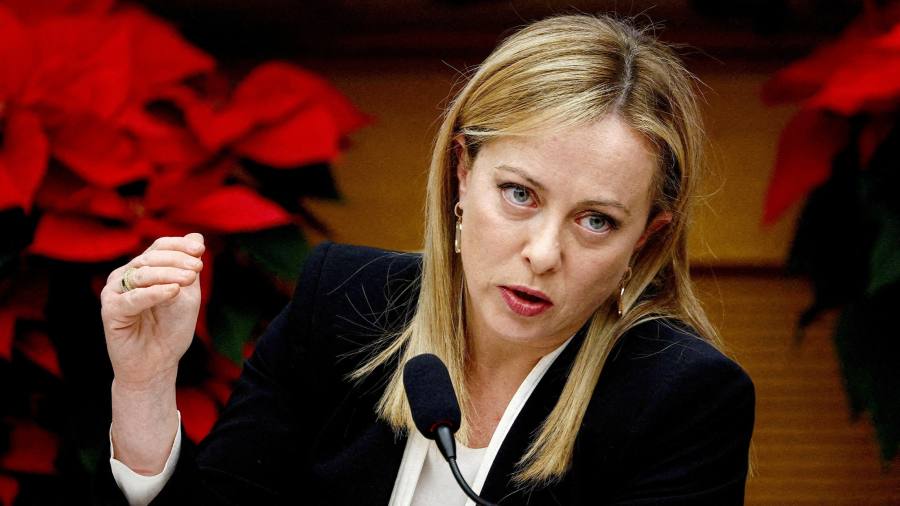Receive free Italian politics updates
We’ll send you a myFT Daily Digest email rounding up the latest Italian politics news every morning.
Italy’s prime minister Giorgia Meloni has taken “full responsibility” for last week’s controversial decision to impose a one-off windfall tax on banks, which she described as her own.
“I would do it again because I believe that the right things must be done,” she said in comments to Italy’s three largest newspapers. “This is a decision that I took on my own.”
The unexpected announcement last week crippled the rightwing government’s credibility with investors and sent shockwaves through financial markets. Italian bank stocks lost up to 10 per cent on the day the 40 per cent tax on lenders’ net interest income was announced.
Less than 24 hours later, the government was forced to partially backtrack, with the finance ministry announcing a cap on the levy that substantially watered down its effect on lenders’ balance sheets.
The one-off levy will be applied to banks’ net interest income for 2022 or 2023, if it exceeds 2021’s by certain thresholds. The tax will be capped at 0.1 per cent of lenders’ total assets.
Meloni said there might have been “issues” with the way the announcement was managed. “I did not involve the coalition as much as usual because it was an issue that did not have to circulate too widely,” she added.
Finance minister Giancarlo Giorgetti, who had previously spoken critically about such taxes, was fully “involved” in the decision, Meloni said.
Several of her coalition partners, including foreign minister Antonio Tajani, a member of the liberal Forza Italia party, said they had been blindsided by the decision. Last week, analysts and bankers said the windfall tax should not have been decided by the prime minister’s office but should have been the subject of thorough discussions between lenders and the Treasury.
Meloni admitted that some members of her government were unhappy about having been kept in the dark. But she said it was necessary given the sensitivity of the matter, adding: “I would do it again.”
“I have utmost respect for the banking system and I don’t want to hit lenders, but there was an imbalance,” she added.
Italy’s government has long been critical of banks’ reluctance to pass on the European Central Bank’s interest rate rises to depositors while increasing borrowing rates. Lenders have reaped large profits from rising interest rates over the past year.
People close to the discussions in Rome and Milan said the government’s most radical members, including transport minister and far-right League party leader Matteo Salvini and under-secretary Giovanbattista Fazzolari, a member of Meloni’s Brothers of Italy party, pushed the PM to introduce the controversial measure ahead of the summer break in an effort to reinvigorate voters’ support.
On Monday Fazzolari suggested the government could go further and intervene in airport and toll road concessions. “We should expect the state to act again when it comes to relations with the large financial, economic and industrial players,” he told conservative daily La Verità.
The government has recently come under fire for its cancellation of the so-called citizens’ income, a monthly allowance for poor jobseekers, and a series of subsidies for home renovations and energy upgrades that had boosted the country’s economic growth since their introduction a couple of years ago.
Negotiations between the government and opposition parties to introduce a minimum wage, which Italy unlike most European countries lacks, have also come to a halt.
“I doubt the issue of low salaries can be solved by introducing a minimum wage,” Meloni said.
Read the full article here




